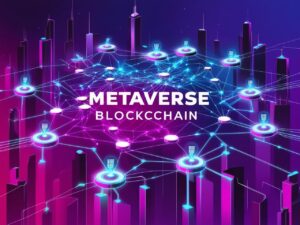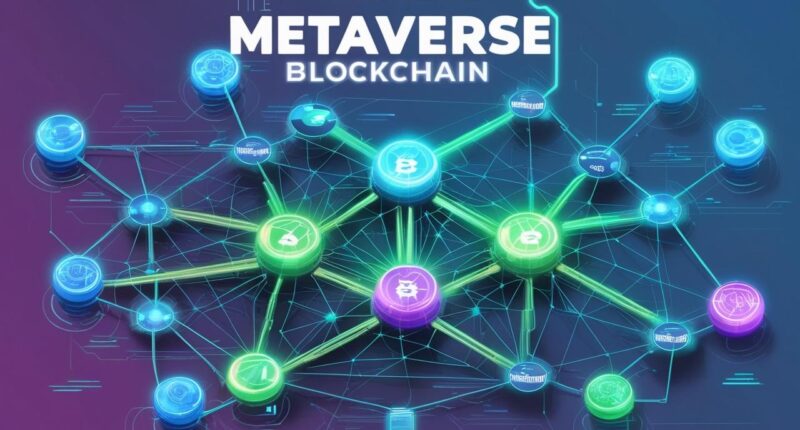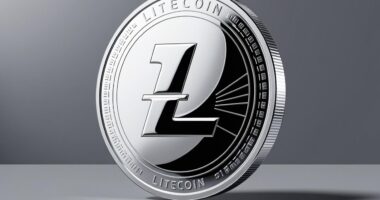Metaverse blockchain creates a decentralized infrastructure for virtual environments. It enables secure and transparent transactions, ensuring true ownership of digital assets. This technology supports cryptocurrencies as primary payment methods and uses non-fungible tokens (NFTs) to represent unique virtual items. Smart contracts facilitate automated agreements between users, while decentralized storage protects data. This combination allows for immersive experiences and seamless interactions in a shared 3D space, benefiting a growing digital economy. Further insights will enhance understanding of this technology.

Metaverse Blockchain
As the digital landscape evolves, the concept of the Metaverse Blockchain emerges as a significant development, representing a virtual shared space that merges both physical and digital worlds. This concept encompasses a persistent, immersive 3D environment accessible through virtual reality (VR), augmented reality (AR), and various devices. Its foundation is built on blockchain technology, which supports a decentralized virtual economy, facilitating seamless interactions in this next iteration of the internet.
Key technologies that contribute to the Metaverse Blockchain include blockchain itself for secure and transparent transactions, cryptocurrencies that serve as the native digital currencies of the metaverse, and non-fungible tokens (NFTs) that represent unique digital assets. Smart contracts enable automated, trustless agreements between users, while decentralized storage solutions safeguard user data and content. Additionally, the Metaverse Blockchain supports decentralized asset exchange, allowing users to trade assets efficiently and securely.
Blockchain plays an essential role in providing the decentralized infrastructure necessary for metaverse platforms. It allows true digital ownership and guarantees asset portability, enabling users to move their assets between different virtual worlds. This interoperability is critical for creating vibrant virtual economies and marketplaces, while also guaranteeing data security, privacy, and user sovereignty. Moreover, blockchain technology facilitates authentication and traceability of complex transactions, enhancing the overall integrity of metaverse interactions.
Cryptocurrencies are integral to the metaverse, functioning as the primary means for in-world transactions and governance. Stablecoins help maintain price stability, while play-to-earn models incentivize user engagement. Cross-chain bridges facilitate the transfer of assets between platforms, and decentralized exchanges enable users to trade metaverse assets freely.
NFTs and digital assets are fundamental to the metaverse, representing ownership of virtual land, items, and identities. They allow for the creation and monetization of user-generated content, providing provable scarcity and uniqueness for digital goods. Fractionalized ownership of high-value assets is also achievable, promoting greater accessibility.
Despite its potential, challenges such as scalability issues, regulatory uncertainty, and user experience barriers still exist. Addressing these challenges may pave the way for broader adoption and utilization of the Metaverse Blockchain in the future.
Frequently Asked Questions
Can I Create My Own Virtual Assets in the Metaverse?
Yes, one can create virtual assets in the metaverse. This involves using various tools and platforms, such as 3D modeling software or NFT minting platforms.
Users can design digital art, virtual real estate, or in-game items. Once created, these assets can be sold or rented on marketplaces.
It is vital to understand legal considerations, such as intellectual property rights and platform regulations, to guarantee compliance and protect one’s creations.
What Programming Languages Are Used for Metaverse Blockchain Development?
Metaverse blockchain development utilizes various programming languages to create immersive experiences and manage virtual assets.
Key languages include C# for Unity, JavaScript for web applications, and C++ for Unreal Engine. Additionally, Solidity is essential for Ethereum projects, while Rust and Go cater to high-performance blockchains.
Specialized languages like Vyper and Move offer alternatives for smart contracts, ensuring developers have diverse tools to create effective and engaging metaverse environments.
How Does Metaverse Blockchain Ensure User Privacy and Security?
Metaverse blockchain guarantees user privacy and security through various advanced technologies.
It employs end-to-end encryption for secure communication and transactions, while zero-knowledge proofs verify data without exposing its content. Users have control over their personal information with self-sovereign identities and decentralized identifiers.
Additionally, tokenization protects digital assets, and privacy-enhancing technologies, such as zero-knowledge rollups and mixers, obscure transaction details, helping maintain user anonymity and safeguarding sensitive information within the blockchain ecosystem.
Are There Any Popular Games Utilizing Metaverse Blockchain Technology?
Several popular games utilize metaverse blockchain technology, enhancing the gaming experience.
Notable examples include Decentraland, where users can buy and sell virtual land, and The Sandbox, a platform for creating voxel-based games.
Axie Infinity allows players to battle and breed fantasy creatures, while Alien Worlds focuses on space exploration and NFT mining.
Star Atlas combines sci-fi strategy with a detailed economic system, showcasing the diverse applications of blockchain in gaming.
How Do I Buy Virtual Land in the Metaverse?
To buy virtual land in the metaverse, one should first select a platform like Decentraland or The Sandbox.
Next, set up a compatible digital wallet, such as MetaMask, and fund it with the necessary cryptocurrency.
After that, navigate the platform’s marketplace to find land parcels, filtering by price and size.
Once a desired parcel is selected, confirm funds are sufficient, initiate the purchase, and wait for blockchain confirmation of ownership.
References
- https://www.alibabacloud.com/en/knowledge/tech/metaverse-in-blockchain?_p_lc=1
- https://www.juegostudio.com/blog/unlocking-the-features-of-metaverse
- https://www.scalingparrots.com/en/blockchain-for-metaverse-what-is-it/
- https://www.gemini.com/cryptopedia/what-is-metaverse-crypto-nft-game-blockchain
- https://www.leewayhertz.com/technologies-for-metaverse/
- https://touchcast.com/blog-posts/metaverse-blockchain
- https://cointelegraph.com/learn/articles/what-is-metaverse-in-blockchain
- https://101blockchains.com/metaverse-features/
- https://academy.moralis.io/blog/exploring-the-metaverse-and-blockchain
- https://chain.link/education/metaverse









